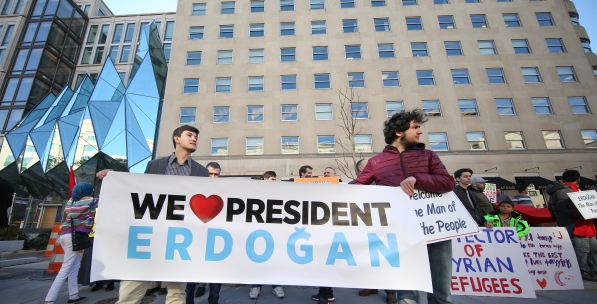
Is Erdoğan the Unwelcome Guest in Washington?
Erdoğan is expending great effort to further develop Turkish-U.S. political relations and strengthen economic relations between the two countries.
Share
President Recep Tayyip Erdoğan has been in Washington since Tuesday. I am also taking part in the committee accompanying him as a member of a think tank. Erdoğan primarily came to Washington to participate in the Nuclear Security Summit, which began yesterday and continues today. The primary matter of this summit, which Turkey has actively participated in since 2010, is how to eliminate the potential risks that will be faced in the establishment of nuclear security. There are two dimensions to nuclear security. The first is preventing nuclear material from being used for destructive activities or terror. The second is the protection of nuclear and radioactive materials. The Nuclear Security Summit aims to increase international partnerships in this area.
The first issue for which increasing international partnerships is necessary is intelligence sharing. Here, countries having an air of being constructive on intelligence sharing are prevalent. The ghost of the Cold War, however, continues to haunt the world system, because global actors have not surpassed the point of using their nuclear capacities as leverage in their search for world order. In the context of nuclear security, this brings the question of how healthy intelligence sharing will be possible among these countries let alone how the international partnership that will be established in the context of nuclear security will not solely comprise intelligence sharing. Another dimension of international cooperation is that these countries would come together to create joint task forces that would be able to deal with security threats and attacks. If nation-states show the same performance that they have in facing the risks brought about by the process of globalization, I am not sure about how optimistic we can be. I hope for all of humanity that a successful summit takes place.
Undoubtedly, these types of international meetings carry meanings beyond their themes and issues. In fact, the leaders that came to Washington to join the summit are trying to transform this platform into a tool to maximize the interests of their respective countries.
In this view, Erdoğan is also searching for opportunities to use this visit as a way to maximize Turkey's interests. Erdoğan is expending great effort in order to further develop Turkish-U.S. political relations and to strengthen economic relations between the two countries.
Referring to Obama's "model partnership" concept, which he uses in Turkey in every speech he gives, Erdoğan is working to pull the relations between the two countries from perception wars to a level of rational negotiation. One of the most important challenges facing Erdoğan at this point is the negative communication campaign begun by the PKK terrorist organization and actors connected to the Gülenist network, referred to as a "parallel structure," which has secretly organized to serve its own interests within the Turkish state. The last factor in this campaign is to create the perception that Erdoğan is not wanted in Washington. Just as in Turkey, Erdoğan has opponents and even antagonists in the U.S. as well. But the propaganda that Erdoğan is not wanted in Washington is nothing more than political manipulation.
On every platform in the U.S., Erdoğan has been explaining to his interlocutors what organizations such as the PKK and the Gülenist "parallel structure" mean and that the accusations brought forward by them have nothing to do with reality, and he has been receiving positive feedback.
Expending effort to develop Turkish-U.S. relations and to correct misperceptions, Erdoğan is faced with another challenge. This is that U.S. politics have already entered the atmosphere of the presidential elections that will happen in November. The election process, in a sense, is something that weakens the U.S.'s sense of global interest and shrinks its international politics agenda.
Despite all of this, Turkey's importance is obvious for decision makers in the U.S. who are aware of the role that Turkey plays and can play in the fragile situation prevalent throughout the Middle East. Although American administrators have lately been limiting this role with the topic of the struggle against DAESH, they have always been keeping Turkey's present and possible contributions in mind.
Some of the actors I have spoken with in Washington have said that not enough attention has been paid to any global matter, including the DAESH threat, due to China's prioritization of changing the balances in East Asia and creating a new order. They emphasize that especially in the election period this interest will lessen even more. However, if American decision makers continue to follow a policy of wait and see in the face of Russia's aggressive foreign policy and the deepening crises in Syria, Iraq, Yemen and Libya, the new period will be a much harder one for the U.S.
[Daily Sabah, April 1, 2016]
Tags »
Related Articles






